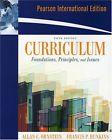A thorough exploration of the historical, philosophical, psychological, and social context for the field of curriculum, Curriculum: Foundations, Principles, and Issues addresses the curriculum process and issues that influence it and encourages readers to consider how new thinking impacts curriculum deliberation, development, and implementation. A more concise Fifth Edition provides both the student and the professor of curriculum with a comprehensive treatment of the field: curriculum foundations as well as the principles and procedures for conceptualizing, developing, implementing, and evaluating curriculum. As in previous editions, it provides solid coverage of the philosophical, historical, psychological, and social foundations of curriculum including recent research and thinking in these areas.
Curriculum: Foundations, Principles, and Issues, continues the tradition of this popular book by providing comprehensive treatment of the curriculum field: foundations as well as the principles and procedures for conceptualizing, developing, implementing, and evaluating curriculum. Edited for a more concise presentation of material, it retains its solid coverage of the philosophical, historical, psychological, and social foundations of curriculum. The Fifth Edition has also been updated to include the most current research and thinking in curriculum including discussion of both technical and non-technical models of curriculum development and how these models might be utilized in a changing and emerging curriculum environment.
NEW TO THIS EDITION:
- Updated to include the most current research and thinking in curriculum.
- Explore the connections between curriculum theory and practice through integration ofkey curriculum theories. Previously found in the Curriculum Theory chapter, this material is now included throughout the chapters in Part II.
- Step through the curriculum process from start to finish in a new chapter organization located in Part II, Principles of Curriculum: Curriculum Design first, followed by Curriculum Development, then Curriculum Implementation, and finally Curriculum Evaluation.
- Prepare for today's standards-based curriculum environment in the Curriculum Development chapter (Ch.7), which integrates the Aims, Goals, and Objectiveschapter found in the previous edition.
- The authors have carefully revised each page for clarity and streamlined content for an optimal learning experience.
FEATURES FOR SUCCESS:
- Curriculum Tips give practical meaning to the research and insights into the curriculum process.
- Focusing Questions set the stage for the main ideas in the chapter.
- Overview Tables provide summaries of major concepts and principles.
